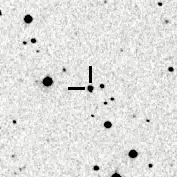"Peremennye Zvezdy",
Prilozhenie,
vol. 6, N 18 (2006)
Prilozhenie,
vol. 6, N 18 (2006)
Optical Variability of the Seyfert Galaxy FBQS J161047.7+330337
K. V. Sokolovsky#1
#1. Sternberg Astronomical Institute, Moscow, Russia.
#2. Astro Space Center of the Lebedev Physical Institute, Russian Academy of Sciences,
Moscow, Russia.
#2. Astro Space Center of the Lebedev Physical Institute, Russian Academy of Sciences, Moscow, Russia.
Received: 29.06.2006; accepted: 30.06.2006
(E-mail for contact: idkfa@sai.msu.ru)
| ||||||||||||||||||||||
Remarks: |
| The optical Variability of the Seyfert galaxy FBQS J161047.7+330337 was detected
during investigation of scanned photographic plates of Moscow collection.
To test the possibility of variable-star search on scanned
photographic plates, we used 80 scans of photographic plates taken with the
Crimean 40-cm astrograph. Just a small fraction of each 10x10 degree photographic
plate
(about 1.2x1.2 degrees, centered on the RR Lyrae variable VY CrB) was used for
the test.
The plates were scanned with a CREO EverSmart Supreme II scanner at the
2400 dpi resolution and examined with VAST software
(Sokolovsky and Lebedev, 2005). As a result, we detected a previously
unknown variable-star-like object, which was identified as the Seyfert galaxy
FBQS J161047.7+330337 (16h10m47.7s +33d03m38s, J2000).
According to the NASA/IPAC Extragalactic Database (NED), it is a Seyfert 1.5 galaxy at z=0.0973. It was first identified as an AGN by Baade et al. (1995). The photographic light curve of FBQS J161047.7+330337 in 1973 - 1975 is presented in Fig. 2. It shows variations with a small amplitude (about 0.3mag) superposed on a 0.9mag trend. A 2MASS image of FBQS J161047.7+330337 is presented in Fig. 1. Images in J, H, and K bands are presented in this false-color figure as the B, G, and R colours respectively. An optical companion about 3" away from the galaxy at PA=226 deg. is visible. It has a slightly different color. It is not clear if the companion is related to the galaxy or not. The finding chart for FBQS J161047.7+330337 is presented in Fig. 3. 
Fig.1 A false-color infrared image of FBQS J161047.7+330337. The blue, green, and red colors correspond to the J, H and K bands respectively. This image was obtained as a part of the Two Micron All Sky Survey (2MASS), a joint project of the University of Massachusetts and the Infrared Processing and Analysis Center/California Institute of Technology, funded by the National Aeronautics and Space Administration and the National Science Foundation. |
| References: |
| Baade, N., Fink, H.H., Engels, D. et al., 1995, A&AS, 110, 469.
Monet, D. et al., 1998, USNO-A2.0, A Catalog of Astrometric Standards (U.S. Naval Observatory, Washington, DC) Sokolovsky, K., Lebedev, A., 2005, in 12th Young Scientists' Conference on Astronomy and Space Physics, Kyiv, Ukraine, April 19-23, 2005, eds.: Simon, A.; Golovin, A., p.79 (VAST: http://saistud.sai.msu.ru/vast) |
Light Curve
Fig. 2. The photographic light curve of FBQS J161047.7+330337. The magnitude scale was calibrated using photographic blue magnitudes of neighboring USNO-A2.0 stars (Monet et al., 1998). Finding Chart 
Fig. 3. A 5'x5' DSS1 image centered at FBQS J161047.7+330337. |